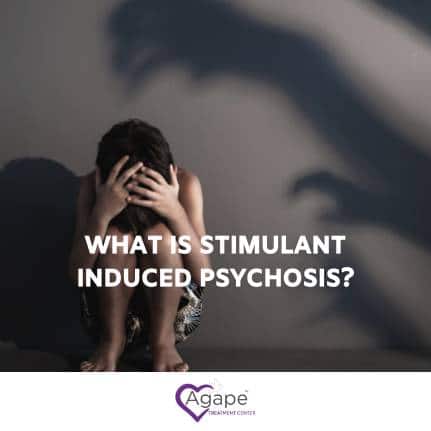Psychosis is a psychological condition in which a person loses contact with reality. Psychosis may be brief, lasting for a few hours or days, or can be a chronic condition, coming and going intermittently over months to years. It can be identified by a person having visual or auditory hallucinations coupled with delusions or paranoia, and although we usually think of psychosis as accompanying a severe mental illness, it can also be caused by drugs in the stimulant family.
Table of Contents
ToggleWhat is Stimulant-Induced Psychosis?
The most common drugs associated with the development of stimulant-induced psychosis are amphetamine, methamphetamine, and cocaine, but legal stimulants such as those found in prescription medications like Adderall, Ritalin, and Vyvanse can also cause psychosis when they’re abused. [1]
Amphetamines are particularly noted for their ability to induce psychosis. Amphetamine-induced psychosis mimics schizophrenia and often requires an evaluation by a physician before a correct diagnosis can be made. [2]
Legal and illicit stimulants include:
Legal Stimulants
- Adderall (dextroamphetamine and levoamphetamine)
- Vyvanse (lisdexamfetamine)
- Ritalin, Concerta (Methylphenidate)
- Caffeine
Illicit Stimulants
- Cocaine
- Amphetamine (can also be legally prescribed)
- Methamphetamine
- MDMA (Ecstasy)
How Do Stimulants Induce Psychotic Symptoms?
Researchers believe that stimulants may cause psychotic symptoms by interfering with the functioning of the neurochemical dopamine, which regulates many vital functions in the brain and nervous system, including perception. [4] It’s worth noting that amphetamines and cocaine greatly impact dopamine, while caffeine has only a mild effect on the brain’s dopamine systems. Consequently, caffeine very rarely induces psychosis, while amphetamines and cocaine are much more likely to do so.
Certain individuals are more at risk for developing this condition depending on a variety of factors, including:
- Individual neurochemistry and genetics, such as the presence of the DAOA/G72 gene. People with this gene are much more vulnerable to both schizophrenia and stimulant-induced psychosis.
- The specific substance ingested. Some stimulants are more likely to produce psychosis, such as methamphetamine.
- The dosage of the drug. Higher doses of stimulants create a larger risk of psychosis.
- The individual’s stress levels. A person experiencing high levels of stress coupled with stimulant abuse is at an elevated risk of a psychotic episode.
- Sleep deprivation.
- Having an underlying mental illness, particularly schizophrenia.
Common Symptoms Of Stimulant-Induced Psychosis
The symptoms of psychosis found in stimulant abuse and addiction are generally the same as psychosis arising from mental illnesses such as schizophrenia or depression with psychotic features. These symptoms include:
- Delusions. Delusions are bizarre and unshakeable beliefs that are patently untrue that a psychotic person nevertheless insists are true. Commonly, individuals will experience various forms of delusions, particularly grandiose and paranoid delusions.
- Disorganized Thinking. Some individuals may display disorganized patterns of thinking, incoherent behavior, and inappropriate social interactions.
- Hallucinations. It is common for individuals with psychosis to hallucinate. Typically, hallucinations begin as auditory and progress into visual or tactile hallucinations. People suffering from stimulant-induced psychosis will often tear or pick at their skin due to tactile hallucinations.
Stimulant-induced psychosis will usually subside within 24 hours of a person’s last dose of a stimulant drug, but symptoms can recur for up to a week to 10 days after one’s last use. In the case of long-term stimulant abuse, psychosis may recur for several months.
Stimulant Abuse Symptoms
Stimulant-induced psychosis is only one symptom of stimulant abuse and addiction. Typically, people who are abusing stimulants to such as degree as to induce psychosis will also experience some of all of the following common symptoms of stimulant abuse:
- Poor attention span
- Decreased ability to concentrate
- Aggression
- Rapid speech, often illogical or nonsensical
- Extreme agitation
- Irregular heartbeat
- Diarrhea
- Nausea
- Vomiting
- High blood pressure
- Dilated pupils
- Rapid, shallow breathing
- Restlessness
- Sleep deprivation
- Tremors, shakes
Stimulant Addiction Treatment
There are effective evidence-based treatments for stimulant abuse and addiction. [5] Behavioral therapies, including cognitive-behavioral therapy (CBT), and more specialized treatments like contingency management and motivational interviewing, help people develop positive, adaptive behaviors.
If you or a loved one battle with an addiction to stimulant drugs, contact Agape Treatment Center today. Our experienced and caring staff can help you or your loved one to begin a new way of life, free from stimulant addiction.
Our trained professionals and addiction specialists are standing by around the clock to assist you or your loved one with guidance and advice. Contact us at (888) 614-0077 for a no-cost assessment of your addiction.
References







